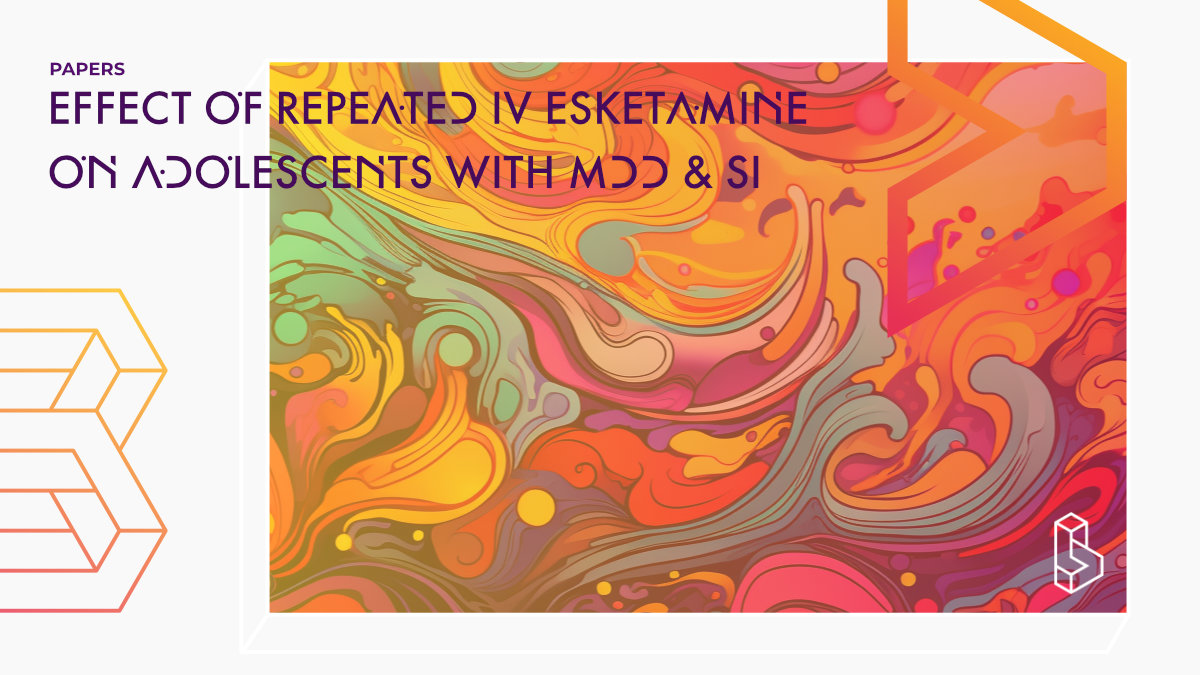This placebo-controlled trial (n=54) investigates the efficacy and safety of esketamine (iv, 17.5mg, 3x) in adolescents suffering from depression (MDD) and suicidal ideation (SI). It shows significant reductions in Columbia Suicide Severity Rating Scale (C-SSRS) Ideation and Intensity scores and Montgomery–Åsberg Depression Rating Scale (MADRS) scores in the esketamine group compared to the midazolam (placebo) group at day six, with maintained antisuicidal and antidepressant responses at four weeks post-treatment.
Abstract of Effect of Repeated IV Esketamine on Adolescents With MDD & SI
“Objective Suicide is a major cause of death in adolescents with limited treatment options. Ketamine and its enantiomers have shown rapid antisuicidal effects in adults with major depressive disorder (MDD), but their efficacy in adolescents is unknown. We conducted an active, placebo-controlled trial of intravenous esketamine’s safety and efficacy in this population.
Method A total of 54 adolescents (aged 13-18) with MDD and suicidal ideation were included from an inpatient setting and randomly assigned (1:1) to receive three infusions of esketamine (0.25 mg/kg) or midazolam (0.045 mg/kg) over 5 days, with routine inpatient care and treatment. Changes from baseline to 24 hours after the final infusion (Day 6) in the scores of the Columbia Suicide Severity Rating Scale (C-SSRS) Ideation and Intensity (primary outcome) and Montgomery–Åsberg Depression Rating Scale (MADRS, key secondary outcome) were analyzed using linear mixed models. Additionally, the 4-week clinical treatment response was a key secondary outcome.
Results The mean changes in C-SSRS Ideation and Intensity scores from baseline to Day 6 were significantly greater in the esketamine group than in the midazolam group (Ideation, -2.6 [SD=2.0] vs. -1.7 [SD=2.2], P=0.007; Intensity, -10.6 [SD=8.4] vs. -5.0 [SD=7.4], P=0.002), and the changes in MADRS scores from baseline to Day 6 were significantly greater in the esketamine group than in the midazolam group (-15.3 [SD=11.2] vs. -8.8 [SD=9.4], P=0.004). The rates of antisuicidal and antidepressant responses at 4 weeks posttreatment were 69.2% and 61.5% after esketamine, and 52.5% and 52.5% after midazolam, respectively. The most common adverse events in the esketamine group were nausea, dissociation, dry mouth, sedation, headache and dizziness.
Conclusion These preliminary findings indicate that three-dose intravenous esketamine, added to routine inpatient care and treatment, was an effective and well-tolerated therapy for treating adolescents with MDD and suicidal ideation.”
Authors: Yanling Zhou, Xiaofeng Lan, Chengyu Wang, Fan Zhang, Haiyan Liu, Ling Fu, Weicheng Li, Yanxiang Ye, Zhibo Hu, Ziyuan Chao & Yuping Ning
Summary of Effect of Repeated IV Esketamine on Adolescents With MDD & SI
Suicide is the second leading cause of death among individuals aged 15 to 29 years worldwide. Ketamine and its enantiomers have been shown to have antidepressant effects and the potential to reduce suicidal ideation in adults with major depressive disorder.
Ketamine has shown success in treating adult MDD, and 1 RCT and 1 open-label trial have suggested that intravenous ketamine might be effective in adolescents with treatment-refractory bipolar depression. However, no RCTs have examined the anti-suicidal effect of ketamine in adolescents with suicidal ideation.
Find this paper
https://doi.org/10.1016/j.jaac.2023.05.031
Paywall | Google Scholar | Backup | 🕊
Cite this paper (APA)
Zhou, Y., Lan, X., Wang, C., Zhang, F., Liu, H., Fu, L., ... & Ning, Y. (2023). Effect of Repeated Intravenous Esketamine on Adolescents With Major Depressive Disorder and Suicidal Ideation: A Randomized Active-Placebo-Controlled Trial. Journal of the American Academy of Child & Adolescent Psychiatry.
Study details
Compounds studied
Ketamine
Placebo
Topics studied
Adolescence and Psychedelics
Depression
Suicidality
Study characteristics
Placebo-Controlled
Active Placebo
Double-Blind
Randomized
Participants
54
Humans
Linked Research Papers
Notable research papers that build on or are influenced by this paper
Short-term cognitive effects of repeated-dose esketamine in adolescents with major depressive disorder and suicidal ideation: a randomized controlled trialThis randomized-controlled trial (n=51) assessed the short-term effects of three subanesthetic esketamine infusions (17.5mg/70kg) in adolescents aged 13–18 with major depressive disorder (MDD) and suicidal ideation. The study found a significant improvement in processing speed and working memory in the esketamine group from baseline to days 6 and 12, with no harm to cognition observed. However, there was no significant association between baseline cognition and the antidepressant or antisuicidal effects of esketamine.

